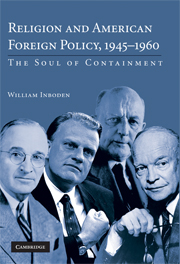Afterword
Published online by Cambridge University Press: 31 July 2009
Summary
If George Kennan's theology of containment informed the beginning of the Cold War, then it seems fitting to return to Kennan at the end of this book. Kennan again assumed the pulpit to survey his world at the end of the 1950s, as he had near the start of the decade. In a 1959 sermon, reprinted in the Atlantic Monthly, he made clear that he still saw communist totalitarianism as an apocalyptic threat and an “abomination to God.” But the Kennan of 1959 was much more chastened and much less certain of how to define the spiritual stakes of the Cold War. With the passing of Stalin and an apparent amelioration of Soviet depredations, the old dichotomies between faith and atheism, good and evil, no longer came so easily.
The world still faced an apocalyptic threat, however. It no longer emanated from the walls of the Kremlin but from laboratories and military installations the world over – even in the United States. Kennan's only Christian certainty came when he viewed nuclear weapons and the burgeoning arms race. And this certainty terrified him, as he concluded that
the truly apocalyptic dangers of our time, the ones that threaten to put an end to the very continuity of history…represent for us not only political questions but stupendous moral problems, to which we cannot deny the courageous Christian answer. Here our main concern must be to see that man, whose own folly once drove him from the Garden of Eden, Eden, does not now commit the blasphemous act of destroying, whether in fear or in anger or in greed, the great and lovely world in which, even in his fallen state, he has been permitted by the grace of God to live.
- Type
- Chapter
- Information
- Religion and American Foreign Policy, 1945–1960The Soul of Containment, pp. 311 - 322Publisher: Cambridge University PressPrint publication year: 2008



